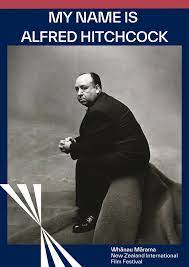
MY NAME IS ALFRED HITCHCOCK
UK, 2023, 120 minutes, Colour.
Voice: Alistair McGowan.
Directed by Mark Cousins.
A documentary about Alfred Hitchcock, about Hitchcock as a person, Hitchcock’s career, focusing on his movies (not on his television series).
There have been many books and documentaries about Hitchcock, for example I Am Alfred Hitchcock, and the important interview book by François Truffaut.
This is a documentary for film buffs. Over the years, Mark Cousins has proven himself a film buff par excellence, the film scholar, a moving man who knows how to comment on films, visualise the history of cinema, invite his audience to enjoy but also to reflect. And this is the case here.
However, he has used a cinematic device, that Hitchcock himself, over 40 years after his death, should narrate his story, describe his filmmaking techniques, his relationship with his actors, his particular themes, and address them to 21st-century audience with reference to 21st-century sensibilities as well is social media, mobile phones…
Most audiences have enjoyed this device though some purists are strongly against it. Mark Cousins has written and directed the film and relied on voice impersonator, Alistair McGowan, to communicate via Hitchcock’s voice and, for most audiences, this will be most persuasive.
The film is divided into various sections, illustrating particular themes that Hitchcock wants to illustrate. There is a long introduction with the title Escape, Hitchcock commenting on the range of escape sequences in his films and their significance. He also plays with the themes of: Desire, Time, Height.
A reassurance for those going into the film and wondering whether every film will have at least a clip and some commentary. All of them are there, the least being his film, Topaz. They don’t come in any chronological order and sometimes audiences will have to wait to the final section to catch a glimpse of their favourite. It is surprising that some films get far more treatment than one might have imagined, whether this is Hitchcock’s choice or Mark Cousins’s choice, but a lot of attention is given to Torn Curtain, Notorious
As regards Hitchcock’s own life, there are scenes of London and where he was brought up in the first two decades of the 20th century, there are the film studios where he worked in the 1920s and 1930s, there is the move to America in 1939, clashes with David O.Selznick about Rebecca, the fact that he was away from England during the war and the number of films he made during the war period, supporting the Allied effort. In fact, the film gives quite a deal of attention in many different ways to his films of the 1940s, even some colour sequences from Under Capricorn.
And there is relationship with his wife, Alma Reville, his devotion to her (dramatised with Anthony Hopkins and Helen Mirren in Hitchcock), their work together, their daughter, Patricia.
Film buffs will be pleased to see so much attention given to Hitchcock’s films of the 1920s, and clips from all of them and some commentary. And, there is quite an amount of material from his films of the 1930s, even Barry Fitzgerald in Juno and the Paycock which he notes that remarks most people will not have seen. There is nothing from Elstree Calling or his Strauss film.
And there is a great deal from Blackmail and from Rope, the 1950s, including some scenes from Stagefright, the mutual murder themes from Strangers on a Train, from Dial M for Murder, The Trouble with Harry, but, especially, Rear Window, To Catch a Thief, Vertigo and North by Northwest.
But, of all his films, it is Psycho it receives most attention, difficulties with the studio, aspects of the filming, many sequences, and even a criticism of the finale in court. And, honouring the 1960s, several sequences from The Birds and Marnie.
Hitchcock made only two films in the 1970s, returned to England for Frenzy, and showing some scenes from his final film. Family Plot, especially a wink at the end.
Hitchcock pays tributes to his cinematographers (but no acknowledgement of his composes like Bernard Herrman). And, he is very much at home with his stars, referring them by name, Cary, Jimmy, Gregory, Ingrid, Tippi… And Henry Fonda as Hank, stating that The Wrong Man is his most serious film, along with his other Catholic film, I Confess.
Probably too bewildering with all the references and quotes for an audience not familiar with the films of Alfred Hitchcock – though, the glimpses of Hitchcock himself and photos, in clips, in statues as well as his evocative voice-over, may be an enticement to follow up.
On the other hand, film students will have their finger on the pause and rewind button just to listen again to the informative detail that Hitchcock gives about how he set up scenes, his camera angles, camera motion, and the reasons for the style of the shots, the film being a masterclass on filmmaking via the creativity and talent of Alfred Hitchcock.